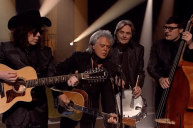[dropcap]T[/dropcap]om Petty may not have "known much about" country music, but country musicians knew a whole lot about Tom Petty. So much, in fact, that Petty undoubtedly ranks among the biggest influences in modern country music.
As news of the icon's death hit the Internet, country musicians shared their grief. "This man changed and saved our lives as kids," the Brothers Osborne tweeted. "Crushed."
Thomas Rhett revealed not long ago that his chart-topping new record Life Changes came when Rhett listened to nothing but Petty for months at a time.
Country songwriters consistently reference their love of Petty in modern country songs. That's why we get songs like "Love You Like That," a Canaan Smith hit in which Smith wanted to love a girl "smooth as a Tom Petty track." Frankie Ballard's "Sunshine & Whiskey" mentions the "Tom Petty up loud."
Old Dominion included Petty's "Free Fallin'" in their lyrics for "Song For Another Time." Steven Tyler mentioned "Tom Petty on the radio" in his solo country work. Tim McGraw referenced Tom Petty in 2009's "Southern Voice." Even back in 2004 Keith Anderson payed ode to Petty in "Pickin' Wildflowers."
The list goes on and on. Simply, Tom Petty helped shape modern country music.
"Bad Rock With Fiddle"
In 2013, Petty said a lot of modern country felt like "bad rock with fiddle." He compared it to the 1980s, where music videos and generic lyrics dominated radio waves. He lamented the lack of a George Jones or Buck Owens figure. And, at the height of bro-country, he was totally right.
But Chris Stapleton, who was still two years from his breakout album Traveller, wrote an open letter to Tom Petty. In it, he basically asked Petty to collaborate in any way possible. "I think it's safe to say most modern country artists, including me, would list you as an influence," Stapleton said.
This year, Petty took Stapleton up on his challenge. He invited Stapleton to open three shows on what became Petty's final tour. But the point remains the same — whether or not Petty realized just how much his music influenced country artists and writers, Petty-isms are inescapable in modern country.
Airtight Melodies and Keeping It Simple
Tom Petty's entire musical style was more or less defined by his remarkable vocal character, yet unremarkable vocal talents. In other words, his voice wasn't fancy. He never hit a significant vocal lick or run throughout his whole catalog. Whether or not he actually "could" is irrelevant. He didn't need to, because the character was there.
Petty's nasally, sometimes Southern, sometimes Dylan-esque delivery also informed the types of melodies he wrote. In many cases, the simpler, the better. In fact, Petty actually started writing arguably his biggest hit "Free Fallin'" while trying to make producer Jeff Lynn laugh with its simplicity. If the opening verse sounds cliche and simple, it's because he came up with it off the top of his head.
After Lynn left the studio, Petty revisited the song and crafted it into a timeless tale of American love and loss. Using three chords and the truth (sound familiar)? And you can't poke a hole in those melodies. Petty ultimately carried his vocal and melodic simplicity into the music The Heartbreakers crafted around him.
The Case For Tom Petty As A Red Dirt Hero
If you've ever thought to yourself, "Man, Texas country and Red Dirt sure sounds like B-grade Tom Petty," you're not alone. Not to diminish the influence of artists like Bob Childers, Waylon Jennings and Leon Russell, but the Texas country and Red Dirt heyday owes as much to Tom Petty as anybody else. There's a reason Pat Green put Petty's "Even The Losers" on his Songs We Wish'd We'd Written II.
The chunky guitars and conversational tone epitomized by Green, Cory Morrow and Cross Canadian Ragweed all have roots in Petty's scope. When you dig into what really made Tom Petty who he was and what makes Texas country what it is, Petty's 1994 album Wildflowers might be as influential as Robert Earl Keen's 1996 album No. 2 Live Dinner.
Outsiders sometimes likened Texas country music and its offshoots (like Steve Earle and Joe Ely) to "Heartland rock," but Tom Petty owned that mantle steadily throughout the 1970s, 80s and 90s alongside John Mellencamp and Bruce Springsteen. Because similar to Petty, Texas country artists don't mind being a little unpolished and rough around the edges.
A Legacy Lives On
There isn't a writer in Nashville who hasn't said out loud in a writing room, "can we make this more Tom Petty?" What does that mean? It means less is more, and don't be afraid to use simplicity as a strength.
Honestly, if every writer lived by the rule of "If Tom Petty wouldn't sing this melody, we shouldn't write it," we'd have a lot more timeless hits in the country world than also-rans that fall off with listeners.
Ok, that might not be fair. But it's clear that Petty means a great deal to the country community when its most critically lauded writers and stadium-packing artists sing his praises in their songs. The best way to pay him homage? Wrap honest sentiment in undeniable melodies, deliver it with an organic attitude and keep it simple. Rest in peace, Tom.




